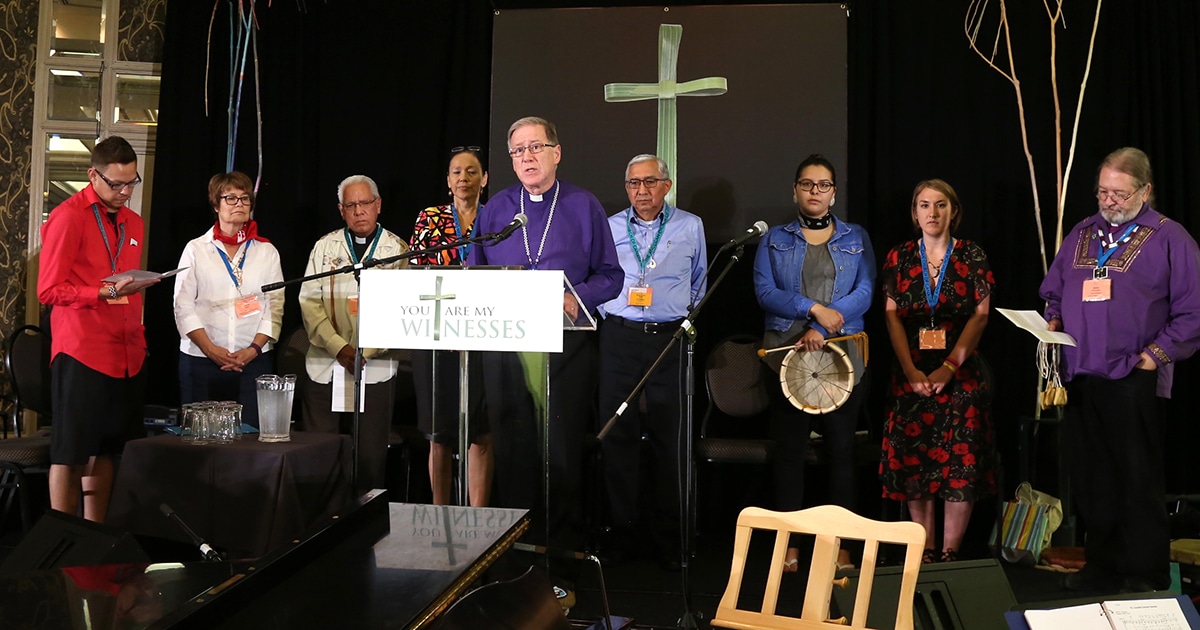The Council of Elders and Youth held its first formal meeting from April 30 to May 3 at a small airport hotel near Winnipeg. The Council was established by Archbishop and Primate Fred Hiltz, and confirmed at General Synod 2016, to monitor how the Anglican Church of Canada would honour its commitment to adopt and comply with the United Nations Declaration on the Rights of Indigenous Peoples.
The six Indigenous council members, comprising individuals of First Nations and Métis backgrounds, include Ms. Judith Moses, bishop-elect Sidney Black, Canon Laverne Jacobs, Ms. Danielle Black, Mr. Aaron Sault, and the Rev. Leigh Kern. Both Archbishop Hiltz and National Indigenous Anglican Bishop Mark MacDonald attended part of the initial meeting.
One of the first decisions of the elders and youth who made up the council was to change their name.
“There were some people who were very uncomfortable with being called a council of youth and elders, especially the elders part,” Moses said. “People are [not] just named an elder; it’s a life-long process and there are identification ceremonies.”
Henceforth, the group will be known as the Vision Keepers Council. Archbishop Hiltz said the council’s desire to change its name was “entirely appropriate” from his perspective, describing it as “a sign of them claiming their mandate and shaping it in a manner that will work for them”.
Members designated Moses and Kern as chair and note-taker, respectively, using Aboriginal titles. In her role as chair, Moses is known as Kahentinetha, a Mohawk term meaning “she who makes the grasses wave”, while Kern as note-taker is referred to as Asinakii, a Blackfoot name referring to the person “who records the story”.
The council meeting opened with prayer, drumming, tobacco offerings on the lawn of the hotel, and recognition of the traditional territories it stood on. During the meeting, members made decisions on key aspects of organization, decision-making, and overall vision, while brainstorming potential recommendations they may make in the future.
The Vision Keepers discussed the Teachings of the Seven Grandfathers as a guide for their values and behaviour. They also created the following mission statement for their work: “To enable Settlers and Indigenous people to become all that the Creator has called us to be, in harmony with each other and the land.”
In an brainstorming session, council members discussed a number of potential steps by which the church might live out its commitments to the UN Declaration. Some early suggestions included:
- Identifying a need for on-going anti-racism training in Indigenous cultural sensitivity for clergy and lay leaders, likely every four years;
- Strengthening links with other Indigenous organizations and structures in the church including the Primate’s Commission on Discovery, Reconciliation, and Justice; the Anglican Council of Indigenous Peoples; and new reconciliation animator Melanie Delva;
- The need for dioceses to develop their own plans for responding to the UN Declaration.
Of the latter, Moses noted, “I think that it’s very important that the church not rely on the Indigenous community to help them to do their outreach, their learning … Obviously, Indigenous Anglicans are happy to help. But we need to see the actions being taken by others, both as a demonstration of their real commitment as well as to do their own learning.”
Further suggestions included:
- Responding to different communication needs in both the Indigenous and settler communities, such as improving translation of key documents into Indigenous languages and communicating progress;
- Thinking beyond introductory tools such as the Blanket Exercise to find other tools and mechanisms for helping parishes move dialogue, understanding, and engagement forward;
- Coordinating work of the council with the Church calendar and prayer calendar to integrate it naturally into the life cycle of the church, e.g. reflections and pastoral resources to help parishes in the lead-up to National Aboriginal Day;
- Opening worship services with acknowledgement of traditional territories;
- Recognizing local Indigenous chiefs or nations in the Prayers of the People;
- Rethinking the practice of swearing allegiance to the Queen in episcopal ordination rites;
- Producing worksheets on values of “cultural safety” to help parishes undertake outreach on the UN Declaration and engage in respectful, meaningful relationship-building across cultures;
- Building an inventory of Indigenous projects that the Anglican Church of Canada is undertaking at a local level across the country.
“There’s a sense that there is a lot of really great stuff going on, but we just don’t know about it from coast to coast to coast, because there’s no mechanism of sharing the learning, of sharing networks,” Moses said. “It’s something that we would like to talk to the new reconciliation animator about … In order for us to assess progress on the United Nations Declaration, we have to know what it is we’re assessing.”
Precise details of how recommendations from the council might be received and implemented remain to be worked out, as do the respective tenure of the members and duration of the council itself. For the moment, the Vision Keepers Council remains accountable to the Primate for its mandate.
Going forward, council members will hold two face-to-face meetings per year and conduct the rest of their business via phone or video chat. Early indications suggest solid chemistry among the council, with Moses praising the “excellent dynamic in the group”.
The National Indigenous Anglican Bishop left with a similar view.
“I was impressed with the passion, energy, and commitment of the Vision Keepers,” Bishop MacDonald said. “They will be a great help in tracing our church’s work in reconciliation.”
Interested in keeping up-to-date on news, opinion, events and resources from the Anglican Church of Canada? Sign up for our email alerts .

